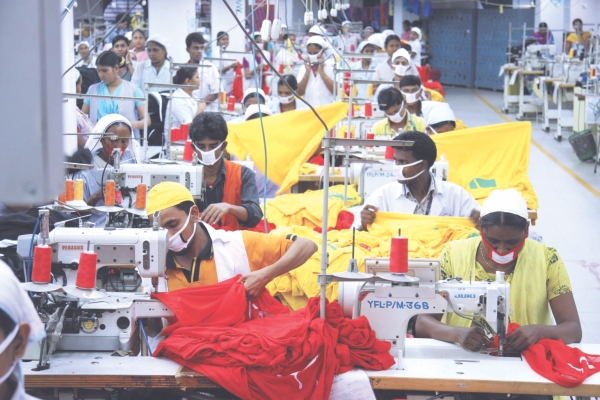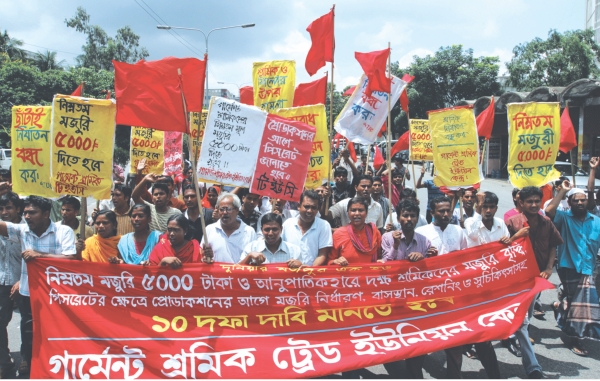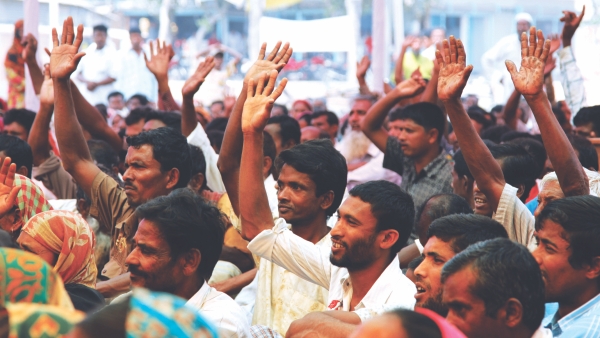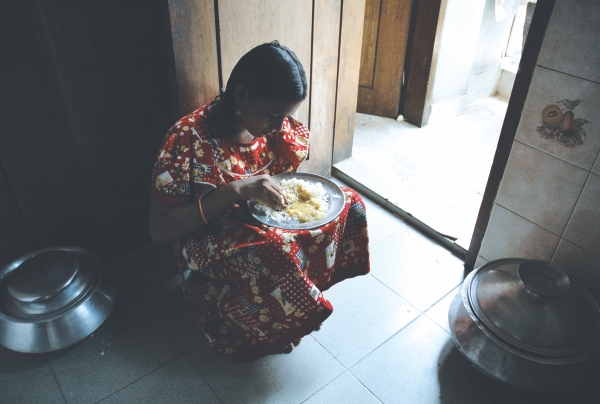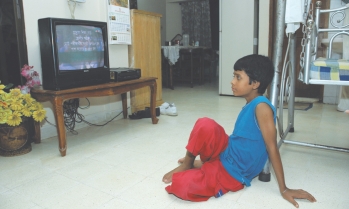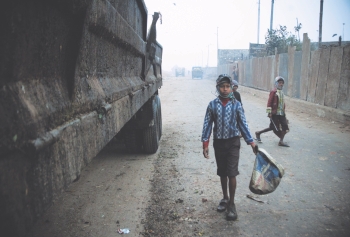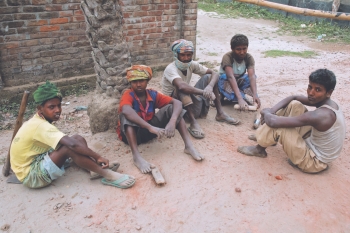| Home - Back Issues - The Team - Contact Us |
 |
| Volume 11 |Issue 18 | May 04, 2012 | |
|
|
Cover Story
Divided We Stand Sushmita S Preetha Come May 1, 40 years since independence, how much have we truly achieved in terms of establishing and protecting the rights of our workers? We have failed to provide them with even the basic rights of a national minimum wage, safe working conditions, job security or appropriate benefits and health facilities. Workers in labour intensive sectors, like the garments industry, are some of the lowest wage earners in the world, living and working in deplorable conditions in the face of unapologetic exploitation. Meanwhile, the informal sector, which constitutes more than 40 percent of the labour force, is not guaranteed any formal state protection, and remains one of the most vulnerable segments of the workforce. Is this the legacy of the once radical worker's movement in Bangladesh? The movement that was characterised by a collective vision for progressive change in the 1960s and 70s is now in disarray. Fragmented and disillusioned, it can no longer serve as an effective and cohesive platform for Bangladeshi workers who strive to fight for their rights. Trade unions, which are traditionally supposed to uphold worker's interests, have all but become pawns in the hands of bourgeois political parties and the global neoliberal economic order.
Contrast the bleak trajectory of the worker's movement now with that in 1969 when, in the backdrop of the mass upsurge against Ayub Khan, the workers of the then East Pakistan conducted the 'gherao' movement. They surrounded the mills and factories, confining the owners and managers inside, until all their demands were realised. “In the process, the trade union leadership which patronised the Pakistani regime was replaced by leftist-activists committed to the worker's movement as well as the nationalist struggle for independence,” recalls Shah Atiul Islam, president of the Bangladesh Trade Union Federation. As a result, a strong and dedicated leadership and a united front were established. Large numbers of workers started to organise themselves in unions, which increased from 411 in 1968 to 1174 in 1971. It was during that period that a national minimum wage was fixed at Tk 125, a minimum rate of pay to be accorded to all workers, whether permanent or temporary, enough to sustain a family of four. It was a substantial achievement for the trade union movement – one that we have not been able to replicate since the independence of Bangladesh. Trade unions and left forces played an integral part in the struggle for liberation, and the hope of a just and egalitarian society reigned supreme in Shonar Bangla. In the newly independent country, however, the trade union movement began to be demarcated along political and/or ideological lines. “The Jatiya Sramik League, which wasn't even a part of the movement in 60s, began to dominate all factories, incorporating – or rather, taking over – both small and big trade unions under its umbrella, and by corollary, the then government,” states Islam. Many trade union leaders got involved with the looting of machines, funds and industrial products, and tried to drive away honest trade unionists from the leadership of the unions. Of course, a handful of other trade unions continued to work for better wages and benefits, but the culture of looting and corruption within trade unions had already begun, severely compromising the integrity and idealistic nature of unions. Since then, every successive government has sought to and succeeded in dominating the trade unions, leading to its present state of mismanagement, inefficiency, corruption, nepotism and partisanship.
Meanwhile, after the demise of the AL government, under Gen Zia, the new military dictator, the political and economic scenario in the country took a turn towards another tragic end. “What Zia did was even more dangerous. He auctioned off many major industries at the price of water to his cronies. He would sell an industry worth 2000 crore taka for only 150 crore, and even give you a bank loan of 100 crore to run the industry. So you could then sell off the industry, part by part, including the land, and declare it bankrupt, stating that the trade unions and worker's movement were the culprits,” argues Firoz Ahmed, from Gonoshonghoti Andolon. Not surprisingly, it was the workers – along with the economy – who suffered the most as a result of the deadly infusion of corruption, greed and politics during Zia's rule.
In the early 1980s, all trade union activities were banned by the military government. In the face of rampant oppression of workers, the National Federation of Trade Unions (NFTUs) formed the Sramik Karmochari Oikka Parishad (SKOP) to establish and protect the rights of workers. Then came the 1990s – the era of free trade and reckless privatisation, whereby Bangladesh emerged in the global market as a competitive force, but at the cost of its labour force. The cheap and exploitable garments workers became the bait to lure foreign buyers into the country. Meanwhile, nationalised industries were privatised in bulk, at the prodding of the World Bank and International Monetary Fund (IMF), leading to mass unemployment and job insecurity. It doesn't take a Karl Marx to tell that a capitalist's interest lies in the exploitation of its workers – the less you pay them, quite simply, the more profit you make. Since the 1990s, the owners have tried to suppress any and all trade union movements and resistances within these new sectors. “Those of us who have been involved with the worker's movement over the last two decades have had to face tremendous repression and cruelty as a result of our resistance,” comments Moshrefa Mishu, president of the Garments Workers Unity Forum. She cites the example of Aminul Islam, labour organiser, who was brutally tortured with a drill machine and then killed. “There are thousands of such examples of workers and activists who have been tortured and killed because they dared to protest,” she adds. The trade union movement, overshadowed by SKOP, is now almost ineffective, according to many prominent labour leaders and left activists. “When AL comes to power, SKOP is run by its members, and the same happens for BNP, and both are interested in exercising their power and amassing wealth, rather than in protecting the rights of workers,” argues Alamgir Majumdar, labour organiser and general secretary of the National Democratic Party. “I am sad to say this, but as of now, SKOP has failed to even present a charter of demands on behalf of the workers. Meanwhile, we, the leaders of the worker's movement, by engaging in partisan politics, are performing the function of 'man suppliers'.” Dr Wajedul Islam, general secretary of Trade Union Kendra, echoes similar sentiments. Stating that the trade union movement is in a very vulnerable state, he argues that the workers are no longer a united unit as a result of the divisive and partisan nature of today's politics. There is a multiplicity of unions in each factory, which means that workers are pitted against each other, with no chance of collectively mobilising to fight a common enemy – the owners.
Meanwhile, many of the more prominent left parties have lost sight of their ideological imperatives in their quest to incorporate themselves within mainstream politics, which is inevitably reflected in the feeble nature of the worker's movement today. As Biplobi Worker's Party General Secretary, Saiful Haq, says, “The worker's movement is dominated today by bourgeois parties and bourgeois philosophies. What some activists, and even some left parties, are doing in the name of the labour movement, echoes the interests, outlooks and ideological positions of the oppressive dominant parties.” Mishu states that people often think that the worker's movement is separate from the struggle for democracy, instead of realising that the former is a prerequisite for the establishment of democracy. “Many people often think that the worker's movement is an economic struggle, not a political one. When I say it's a political struggle, I don't mean political interference from different parties, but rather that there needs to be an ideological position from which we direct this movement,” she adds. Given the above scenario, it is no wonder that the strong and progressive worker's and trade union movement of the yesteryears is now directionless, divisive and in despair. With no overarching political ideology to guide the workers and the left parties towards a more democratic and equal society, the movement risks becoming a relic of a capitalistic and opportunistic present. The state, as of now, is a bourgeois state, which maintains and protects the interests of the middle and upper classes, at the expense of an overwhelming majority of its citizens. Its function is to assist capitalist expansion and the efficient functioning of the free market. There has been economic growth, sure, over the past few decades, but it has been perversely uneven. Exploitation, poverty and degradation have never been so unbridled, so extensive and so unrepentant. The country is brimming with the objective conditions for a revolution that, if led by a grassroots people's movement, will usher in a new dawn for the millions of poor, who, like the proverbial proletariats in history, have nothing to lose save for their chains and have a world to win. But in a country where communist parties and groups have lost their way in the labyrinth of liberalism and election-based politics, a true democratic revolution seems like a far cry. Washing the Dirty Laundry Anika Hossain
In 2011, a Hollywood movie was released, called “The Help” which is based in the United States, during the civil rights movement in 1960. The movie is about a young white woman aspiring to be a writer, who decides to write a story from the point of view of African-American maids, who share their experiences working for white families. Although technically, these women were no longer slaves, they worked on very hard terms. They received bare minimum wages, worked long hours, had few legal rights and very few if any, received respect from their employers whose children they were so lovingly raising. The protagonist of the movie was outraged when a law was established stating that the maids would have to use separate bathrooms as they carried diseases that were “unknown” to the white population. She was disgusted by the hypocrisy and blatant discrimination that existed in the society, causing one group of people to dehumanise another. This Oscar winning movie has made its way into the Bangladeshi DVD stores and ironically enough, has been well received by the audience here. They claim to be “deeply moved” and “heartbroken” by the injustice of it all, never once thinking that if the protagonist of the movie, made her way into some of their own homes, she would probably have a coronary attack. We Bangladeshis may live in the 21st century, but when it comes to dealing with our house help, we may as well live in the dark ages. Domestic workers in Bangladesh do everything from washing, cooking, babysitting to cleaning our messes as many as three to five times a day, not to mention being at our beck and call for a glass of water, tea, a foot massage—there is really no limit. For all this, they are rewarded with little respect, and are treated like untouchables. They use separate dishes to eat, are never allowed on the furniture and are generally expected to keep out of sight. 14-year-old Shanti, lives in a large five bedroom apartment with her affluent employers, a family of five says, “My daily work includes cooking breakfast, lunch and dinner for the family, cleaning the house twice a day, making tea and anything else they might need me to do. They send their clothes out to the laundry so I don't have to wash them.” Najma, a middle aged woman, works for an upper middle class family. “My job is to cook, wash up in the kitchen and look after the children,” she says. “I wake up as early as 6 in the morning and I work sometimes till 1 or 2 at night, after everyone is home and have eaten and gone to bed.” 15-year-old Nilufer who lives in an independent house with her employers says, “I usually sleep in the kitchen, but in the summer when it gets too hot, I am allowed to sleep in the veranda. I eat what is given to me and my mistress chooses my clothes. I get new clothes twice a year, during Eid.” Nilufer has not been home to see her family in over a year. Most of these workers have no fixed work hours and are at our service twenty four hours a day. They receive very little leave time and weekends are out of the question. Most have no room of their own and are made to sleep in the kitchen or other areas of the house and of course domestic workers in every household, use separate bathrooms. In our country, we don't even need to give them a reason. That's just the way it is. “There are no provisions for domestic workers under the Labour Law in this country,” says Borhanuddin Khan, Professor of Law at Dhaka University, “This deprives them in many ways of their basic rights.” Because of this lack of acknowledgement, many employers do not feel a sense of responsibility toward their house help as they are not held accountable for their treatment of them.
“I am very strict with my servants,” says Pia Haider (not her real name), “I don't let them watch too much TV because they might start getting ideas into their heads. I also don't let them keep mobile phones because I don't want them discussing everything that happens under my roof with their families.” Amna Ali (not her real name), who employs 10-year-old Salma to do most of her housework and take care of her 5-year-old daughter says, “She isn't too young to start earning her own living. It's better than begging on the street. Besides she gets three meals a day here and it's safe.” Over the years, NGO's have recommended various processes through which domestic workers could be covered by the labour law. “However this did not happen because of some technical problems regarding how to set it up,” says Professor Borhanunddin Khan. For example, under the labour law, which is designed for industry and factory workers, the employees work eight to twelve hours a day continuously with not more than an hour's rest. Domestic workers do not have fixed schedules and are called on sporadically during the day to do their work with more than one break in between. Keeping track of domestic workers hired in private homes is also a challenge. “Given these circumstances, in my opinion it is more important to create a separate law for domestic workers than to include them in the labour law,” says Khan. According to Khan, domestic workers are only a part of the informal sector, the whole of which has been excluded from the labour law. “Think about the day labourers working at construction sites or brick mines, or the women in agriculture” says Khan. “They make significant contributions to our economy. We have to first figure out how to give this entire sector recognition, before we can address specific issues such as those of domestic workers.” Advocate Salma Ali, the executive director of the Bangladesh National Women Lawyer's Association (BNWLA) believes that it is imperative that domestic workers be acknowledged as a part of the labour force as soon as possible. “Domestic workers are perhaps the most vulnerable people in this country. They are probably the most violently abused group within our society and have little or no legal representation,” says Ali. “There is a class of people in our society, especially those from small towns and villages, who brutally abuse these workers simply because they can get away with it Most of the domestic labour force is made up of young girls, some of whom are being physically and sexually abused. If there are no laws that recognise their existence, how will they be protected?”
In an attempt to bring these domestic workers into the labour force and under the protection of the law, several civil society organisations and NGO's worked together and submitted a memorandum as well as a code of conduct to the Ministry of Labour and Employment on January 9, 2008. “About twenty five different orgranisations participated in drafting this,” says Farida Yeasmin, the deputy director of BLAST (Bangladesh Legal Aid Services and Trust). “Our first objective was to include domestic workers in the labour law, but the law and policy makers were against this. After many discussions and debates we realised that in order to include domestic workers in the labour law there must be a separate section made for them entirely because there are many differences between a member of the formal labour force and a domestic worker, so we came to a decision to draft a policy and then work towards including them in the labour law in the future.” The draft outlines the responsibilities of the employers towards the domestic workers they hire and define their role as well as that of the worker and the government. The memorandum states that a contract must be drawn up when a domestic worker is being hired. This contract will outline their duties, salary, leave time, hours of rest and relaxation, living quarters, education and medical facilities they can expect to receive etc. It states that the workers must be registered with the nearest police station upon employment and records have to be kept about themselves, their families, their permanent address and employer's name and address. The memorandum also covers maternity leave, work hours, the government's responsibility to fix wages, to monitor domestic workers, issue legal ramifications for any kind of abuse towards these workers. The memorandum also suggests the establishment of special monitoring cells where domestic workers can place complaints if any and a hotline they can call if they need assistance. It also suggests that children under the age of 14 should not be employed as domestic help. Unfortunately, this policy is yet to be approved by the ministry. “In my opinion having a law won't always work in a country like ours,” says Professor Borhanuddin Khan. “Social mobilisation is needed to bring about change in the existing system. We need to work on our values, morals and our conscience. As a citizen of this country, my civic, economic, political and social rights need to be protected no matter what I do for a living. There doesn't need to be a separate law for the protection of basic human rights, the Constitution covers that.” According to Khan, there are some situations that call for an evolution rather than a revolution, and this has already begun, albeit on a small scale. “Nowadays it is so difficult to find someone to work in your home that some people are willing to pay large amounts to get help,” says Khan. Most people prefer to join the garments industry or local factories than work at someone's home, because they have more independence that way.” “My mother used to shout at our servants a lot when I was younger,” says Sonia Khan, “That attitude changed dramatically as time passed. She is so afraid they will leave, she bought them their own TV, and they have mobile phones and are allowed to go out once in a while.” This attitude has been adopted by many upper middle class families because most of us are so dependent on our help, we cannot imagine a life without them. While these are positive signs toward change, our attitudes must also change for the right reasons. Thinking of domestic help as inferior beings, who can cook our food but never sit at the same table to eat with us, is the attitude that needs fixing. We must treat them with empathy and respect, not just to persuade them to work for us, but because they deserve it. It is not easy to alter a frame of mind that has been governing our lifestyles for centuries. The protagonist of “The Help” was faced with a similar challenge and she chose to raise awareness through her book. Educating ourselves and those around us is a small but effective way to begin a much needed social evolution.
Lost Childhood Akram Hosen Mamun During the last couple of years, the news media have extensively covered the inhuman working conditions of the balloon factories operating at the ghettoised industrial areas on the outskirts of Dhaka. The factories have hit the headlines so many times that it has become almost a cliché. But the factories are still operating under the same conditions at Kamrangirchar, along the river bank. There are many balloon factories in Keraniganj and Hajaribag. Thousands of children aged 7 to 12 work in these factories. The thick layers of powder around these factories can be seen even from the street. Even if one misses the white fog, there is no escaping the stench of acid, rubber and synthetic pigments. The cheap powder that is being used to unwind each balloon from the steel frame creates a thick white fog of powder in the factories. After working for 12-14 hours in the factory, the boys emerge from their work looking like powder covered monsters with bloodshot eyes. Milon, a 10-year-old boy, who has been working in a factory for the last three years, already suffers from coughing and sneezing most of the time. His eyes constantly sting from the noxious fumes. Asked if he knows what the powder and chemicals are doing to him, he says, "I don't know much about that."
Milon went to primary school and studied till Class 2. "But then my father sent me to the factory with other kids in the neighbourhood," he says. Obviously, he did not have any say in the matter. The owners claim the powder they use is talcum powder and not harmful. But talcum powder, when inhaled, poses serious risk of causing aspiration and pneumonia. "Moreover, excessive exposure to colouring pigments can cause cancer. Any kind of exposure– be it direct or through inhaling can allow it to penetrate inside the body and cause diseases, even stimulate cancer," says Prof Nilufar Nahar, Department of Chemistry, Dhaka University. "I can see that my son's health is deteriorating, but his income is a support for me. Besides, all the children in the area works in the factories," says Milon's father Jamal, when told about the health risks of working in a toxic environment. In another part of Dhaka, Sentu, a mechanic and owner of an automobile workshop near Dholaikhal, is overhauling a large engine well past midnight. A couple of 10 to 12-year-old boys are helping him with the tools and cogs. The boys have arrived at the garage at nine o'clock in the morning when the dismantling of the car engine commences. By the evening, all of them are covered in dust, soot, grease and kerosene from head to toe. Shakil, the younger boy, appears to have symptoms of night blindness. He wipes his eyes with his sleeves at regular intervals while his hands fumble with the tools. When his father Belal, a taxi driver, brought him to the garage, he had begged Sentu to take the boy as an apprentice. "Beat him hard if he turns out be a lousy worker," Belal had told Sentu. The question of paying the boy for his labour was not even considered. Sentu informs that his garage remains open seven days a week but, "of course, when they get sick, they can take a couple of days off work." Ironically, as he speaks, there is a sticker with slogans against child labour lying on his table. Hanging on the wall, is a special Dhaka City Corporation (DCC) notification stating no children (below the age of 18) should be employed in factories or industries with hazardous work environments.
"I went to a primary school for three years, but my father took me out of the school and sent me to a madrassa, says Shakil. "After about a year of going to that madrassa, I could not learn anything, because I'm a lousy student," he adds smiling. Asked if he likes working in the garage, he says, "We boys have fun in the garage when the big ones are not around." The other, comparatively older boy, Siraj also came to the garage when he was nine. "When I arrived here, the mechanic named me Kallu, after my skin colour," says Siraj laughing. He adds, "Nobody knows my real name anymore." All of the little boys agree that they receive physical punishment almost everyday in the garage. Their hands and arms have many cuts and bruises from working with heavy machines. None of them were asked if they wanted to go to work instead of going to a school. When contacted, the Chief Executive Officer of DCC South informs that he does not know about the notice regarding child labour but he guesses that it was issued before the corporation got divided recently. He then refuses to comment further on the matter. The conditions for child labour in manufacturing of jute rope, steel, and kitchen utensils are even more horrendous. Since the mid 80s, thousands of children have been unscrupulously employed in the bidi (cheap cigarettes) factories in the northern districts of the country. In an extensive study in 1997, anthropologist Therese Blanchet, observed that many of these workers suffered from lung related diseases, and even throat cancer, after their adolescent years. Children start working in the factories as the day breaks. When hundreds of labourers begin to insert tobacco in the paper rolls, the air inside the hall becomes so thick with tobacco dust that it gets harder to breath. The bidi factories have very little ventilation, and during summer, hundreds of workers huddle together and make bidi. Children aged 8 to 14 work for 12 hours in the gloom of the bidi factories. According to the National Child Labour Elimination Policy adopted by the Ministry of Labour and Employment in 2010, hazardous work for children includes working more than five hours a day, work that creates undue pressure on physical and psychological wellbeing and development, work without pay and work where the child becomes the victim of torture or exploitation or has no opportunity for leisure. The policy also provided a framework aiming to eradicate all forms of child labour from the country by 2015. To achieve this, the policy makers hope to enact laws and improve law enforcement methods. The existing Labour Act 2006 prohibits employment of children less than 14 years of age and bans hazardous forms of child labour for persons under the age of 18. However, despite these laws and policies, child labour still remains so visible in the city that it has ceased to be shocking. In a 2009 study by the UN Committee on the Rights of the Child, it was expressed that many Bangladeshi children continue to work in five of the worst forms of child labour, namely welding, automobile workshops, road transport, battery recharging and tobacco factories. Children can always be seen working at tea stalls, restaurants, supermarkets, factories and selling goods in between traffic on busy streets. Of the 7.4 million working children aged five to 17, about 3.7 million are presently engaged in hazardous labour. Kashem Masud, Project Director of Eradication of Child Labour, says, "Initially, we decided to eliminate all forms of child labour from the country but considering the socio-economic realities of Bangladesh, we have narrowed down our focus into saving all children from hazardous works by 2015." However, when asked about the steps that have been taken to reach that goal, he says, "Poverty is the main cause of child labour in Bangladesh. When the parents force their children to earn for the family, it becomes harder to enforce the law." Employing children effectively goes against the fundamental principles of our constitution and Bangladesh is one of many countries that signed the International Labour Organisation (ILO) convention on labour rights. "With the international community, we are trying to eradicate child labour from the country. The state is supposed ensure all the basic rights to every child of the country," says Masud. But to this day, saving children from potentially hazardous works, not to mention the hope of ensuring basic rights for all children, remains a far cry. In most of the research on child labour, including the ones conducted by ILO, poverty is generally pointed out as both the main cause and consequence of child labour. However, this view reflects a rather simplified explanation of a more complicated-- and, for that matter, a multifaceted-- problem. To begin with, the parents who send their children to work in the factories are poor. But poverty is not the only reason why they take their children out of school and send them to work. For example, like most of the boys working in the automobile workshops, Shakil works without a salary. As a result, his father Belal does not expect to get any financial support at the end of the month. When asked, the taxi driver says, "I want him to be an automobile mechanic. Only the boys who go to the garages from childhood can become mechanics." Therefore, it is for Belal's hopes and dreams of a better life and social status that he sends his son into a hazardous workplace. It is also curious to note that he does not consider elementary education a necessity for children. However, when asked, automobile mechanic Sentu says, "The chances that this boy will become an efficient mechanic in future are slight, because the boy can hardly read Bangla or English." He also said that the boys who can read manufacturer's instructions would find it easier to become mechanics. Nevertheless, like all the other garage owners, he keeps young illiterate boys in his workshop as apprentices. Abdullah Salam, a mason who lives in Madartek, had also taken his son Shamim from school before he finished his primary education, and sent him to work in a welding workshop in Kamalapur. After several years, the boy, now 15, has become quite skilled in welding and now earns enough to support his father. Shamim has one older and two younger sisters; his parents do not expect them to earn a living. Instead, they are trying to marry his sisters off. Abdullah thinks that sending girls to work in factories or as domestic help is a disgrace to the family. In this instance, the discriminatory view towards girls has created the need to keep them at home. As a result, Abdullah's son has had to bear a tremendous responsibility, and from a very young age. Child labour and the scope for education are interrelated in many ways. Nearly 50 per cent of children drop out before they complete primary schooling. There is no doubt that these school dropouts add to the number of child labourers. The insufficient number of government primary schools and lack of awareness are also important factors. While the government and NGO projects on eradicating child labour proceed at a snail's pace, the future of thousands of children becomes darker. Meanwhile, these unfortunate children provide an unending supply of cheap and unskilled labour in factories, making Bangladesh a leading country in producing goods made by child workers.
|
||||||||||||||||||||
Copyright
(R) thedailystar.net 2012 |
